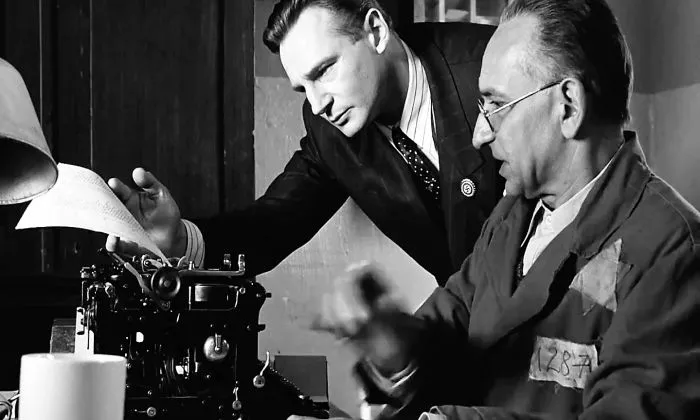“Schindler’s List,” directed by Steven Spielberg and released in 1993, is a powerful and poignant film that delves into the Holocaust through the true story of Oskar Schindler, a German businessman who saved the lives of over a thousand Jewish refugees. The film is based on Thomas Keneally’s novel “Schindler’s Ark” and stars Liam Neeson as Oskar Schindler, with a supporting cast including Ben Kingsley and Ralph Fiennes. At its core, “Schindler’s List” is a deeply moving exploration of humanity, morality, and the enduring impact of one individual’s acts of courage in the face of unimaginable evil.
Humanity Amidst Horror
One of the central themes of “Schindler’s List” is the portrayal of humanity amidst the horror of the Holocaust. The film depicts the atrocities committed against the Jewish population by the Nazis, including the establishment of the Kraków ghetto, mass deportations to concentration camps, and the ruthless violence inflicted upon innocent civilians. Amidst this darkness, Oskar Schindler emerges as a beacon of hope and compassion, demonstrating the capacity for individual moral agency and empathy even in the darkest of times.
Oskar Schindler’s Moral Awakening
The character of Oskar Schindler undergoes a profound moral awakening throughout the film. Initially motivated by profit and opportunism, Schindler gradually becomes increasingly aware of the human cost of the Holocaust and the suffering endured by the Jewish population. His transformation from a pragmatic businessman to a righteous protector is a central narrative arc, highlighting the transformative power of empathy and conscience.
Schindler’s moral awakening is exemplified by his efforts to save Jewish lives through the operation of his enamelware factory in Kraków. He risks his own safety and financial security to protect his workers, employing them under the pretext of essential war production and shielding them from deportation to concentration camps. Schindler’s actions underscore the importance of individual responsibility and moral courage in the face of systemic injustice.
The Importance of Moral Choices
“Schindler’s List” underscores the importance of moral choices and individual agency in the context of historical events. The film challenges viewers to confront questions of ethical responsibility and complicity, highlighting the consequences of indifference and silence in the face of injustice.
Schindler’s decision to take action against the Nazi regime serves as a powerful example of the impact of individual choices on the course of history. By leveraging his influence and resources, Schindler embodies the notion that one person can make a difference, however small, in the fight against oppression and tyranny.
Reflections on Human Goodness and Evil
The film prompts reflections on the complexities of human nature, portraying both acts of unspeakable cruelty and extraordinary acts of kindness. Characters like Amon Goeth, the sadistic SS officer, and Itzhak Stern, Schindler’s loyal accountant, represent contrasting facets of human behavior and moral character.
“Schindler’s List” challenges simplistic narratives of good versus evil, emphasizing the inherent capacity for both darkness and light within individuals. The film underscores the enduring struggle between conscience and complicity, highlighting the imperative to confront moral dilemmas with courage and integrity.
Lessons of Remembrance and Resistance
“Schindler’s List” serves as a poignant reminder of the importance of remembrance and resistance in the face of historical injustices. The film pays tribute to the resilience and courage of those who endured the Holocaust while honoring the memory of the millions who perished.
Through its unflinching portrayal of suffering and redemption, “Schindler’s List” compels viewers to confront the legacy of genocide and to actively preserve the lessons of history. The film calls upon individuals to uphold the values of empathy, solidarity, and moral integrity as essential safeguards against the recurrence of atrocities.
Conclusion
In conclusion, the main point of “Schindler’s List” is a profound exploration of humanity, morality, and the enduring impact of individual acts of courage amidst the horrors of the Holocaust. Through the character of Oskar Schindler and the portrayal of historical events, the film underscores the importance of moral awakening, ethical responsibility, and the transformative power of empathy. “Schindler’s List” challenges viewers to confront the complexities of human nature, reflecting on the enduring struggle between good and evil and the imperative to remember and resist injustice. Ultimately, the film inspires reflection, remembrance, and a renewed commitment to upholding the values of compassion and justice in the face of adversity.
Related Topics:
Film Review: “Schindler’s List” (1993) Directed by Steven Spielberg
The Symbolism of the Girl in the Red Coat in “Schindler’s List”
Ralph Fiennes: Portraying a New Kind of Evil in “Schindler’s List”

